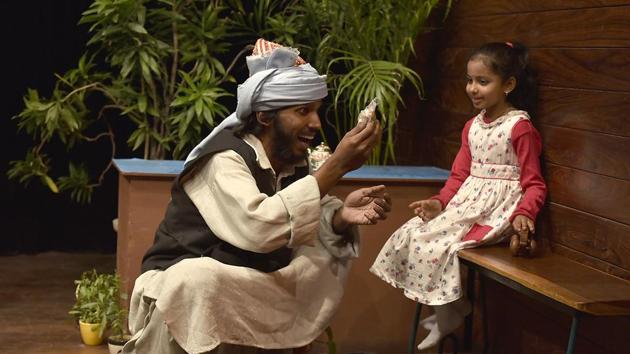A play for all time: The Cabuliwala is back
An adaptation of Rabindranath Tagore’s iconic children’s story, which has been retold several times on the stage and on screen.
Rabindranath Tagore’s short story on a Kabuliwallah has had two outings in cinema. In 1957, director Tapan Sinha made a Bengali film starring actor Chhabi Biswas in the role of the protagonist, Rahman. In 1961, Balraj Sahni played the middle-aged dry fruit seller from Kabul in a Bimal Roy production.

Rahman hawks on the streets of Kolkata and lends money on the side. The only person with whom he does not have a relationship of barter and exchange is little Mini, a chatty five-year-old who calls out to him from her window one day. Rahman visits her daily and gifts her pistachios, almonds and walnuts. Mini reminds him of his daughter Amina whom he has left behind in Afghanistan.
Mini’s father overcomes his initial fears of a stranger and lets Rahman play with his daughter. His wife, whose middle-class gentility seems forever threatened by the appearance of cobwebs, real and imagined outbursts of malaria and the sudden appearance of an unknown face on the street outside her home, disapproves. This story of two fathers — Amina’s and Mini’s — and the possibility of a relationship of affection in unfamiliar places gets another showing this weekend in Delhi.
Read more: A Tagore Primer for non-Bengalis
Stage actress Jalabala Vaidya presents ‘The Cabuliwala’ (“That is how Tagore spelt it in his English translation,” she says) at the Akshara Theatre which has also been the home of Vaidya and Gopal Sharman, her playwright-husband. Sharman died last year. Vaidya, a veteran of one-woman performances, most notably the Ramayana, plays Tagore.
“I have played men before, not a big deal…I play Tagore on stage reflecting about the play,” adds Vaidya who staged Cabuliwala for the first time in the early ’90s. This weekend, the play will go on stage for the 30th time.
In 2006, three years after his retirement, British High Commissioner Rob Young, in fact, returned to Delhi to play the fruit seller on the Akshara stage. Reports are he did a neat Pathan accent. It must have raised a few laughs — an Englishman being asked to bitch about British colonial policy in the Northwest Frontier provinces. The Anglo-Afghan war was the stage of what is called the Great Game, the first face-off between Britain and other Western powers in the 19th century for control over central Asia. There are lines in the story when Mini’s father asks the Cabuliwalla about whether there were any advantages of being ruled by the British.
“And he answers: “I’ve just come for Mini.” In Tagore’s story, he is a character who is being true to his own emotions as a father. He is not interested in what states or governments do,” explains Vaidya. “A bond of affection is possible between a middle-aged Cabuliwalla and a middle-class child. At the first sign of an unfamiliar bond, we might immediately now see child abuse, but Tagore was saying you cannot be so hide-bound by convention. You must not be…”
This weekend, Ananya Anil plays Mini; R S Raghu plays Cabuliwala; and Yuvraj Bajaj acts as Mini’s father.
What does the play take from the film? Vaidya says she has seen the Balraj Sahni version. The poignant ‘Ae ere pyare watan’ song has been the only takeaway. A recording of the song is played at the end of the play.
And the protagonist? Was Sahni an influence? Every actor, says Vaidya, represents himself. “A Punjabi leftist, Sahni played Cabuliwalla too strongly. An actual Cabuliwalla might not have expressed his opinions so assertively,” she says. “In his dealings with Mini’s father, Sahni made it a relationship of equals. With Mini, he did okay.”
What: The Cabuliwala
When: 7 pm, March 18 and 5.30 pm, March 19
Where: Akshara Theatre, 11 B, Baba Kharak Singh Marg
Nearest metro station: Patel Chowk
Tickets: Available on bookmyshow.com





